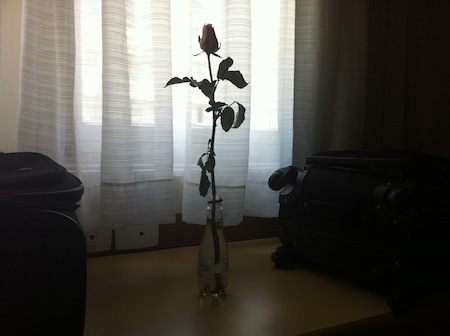Temporary Vases and Speaking Clocks
Sunday, February 9th, 2014
The experience of a three-star hotel: an encounter with minimalism, but one far from a coveted industry or the sheerness foregrounded in such denominated art form. Minimalist as in a modest environment, as in its offerings cover basic necessities, as in be resourceful. A place undressed and, probably for its matter-of-fact lack of accessory, it simply goes unaddressed. At one three-star, the Everest, the one across a tiny cobblestone bridge hovering over a rumored magnetic field, the one becoming at a certain point a temporary home, time could be made to consider time in art. At that high-rise, which seemingly single-handedly assigned its stars, and I surmise it was a under the basis of its relative place in geography, since these were unmerited in reality, however, stars that were ultimately the only thing that lit those nights, hence, appreciated, contemplated, there, I ruminated on the cultural perceptions and manifestations of time invested, gained, expended in the arts. Time considered less as actual ends of a work, say, of a moment’s condensation in some type of material crystallization or topical representation, whether anticipated or unintended. Time, then, as it’s being occupied through, by, art, and so, art as an occupation that overturns conventions of productivity, resistance, and (why not?) love.
*
To create the telephone artwork Nostalgia Arrow (2013), artist Nicolás Bacal took inspiration from the now relatively outdated Speaking Clock. A telephone service operating since the 1930s, first from a French Observatory, a Speaking Clock automatically provides its callers the correct time of day. To create his artwork, Bacal invited Eloí Cruz, the voice talent for the Speaking Clock in Brazil, to read a poem on the perception of time. This poem turned telephone voice-over was penned by Bacal in collaboration with Sebastián Villar Rojas. Last year, during the exhibition period of the 9a Bienal do Mercosul | Porto Alegre, Eloí’s recital could be heard by dialing a telephone number; today, you can listen to it here, in a video documenting an experience of this work, which Bacal recorded during his hotel stay in Porto Alegre, Brazil.
